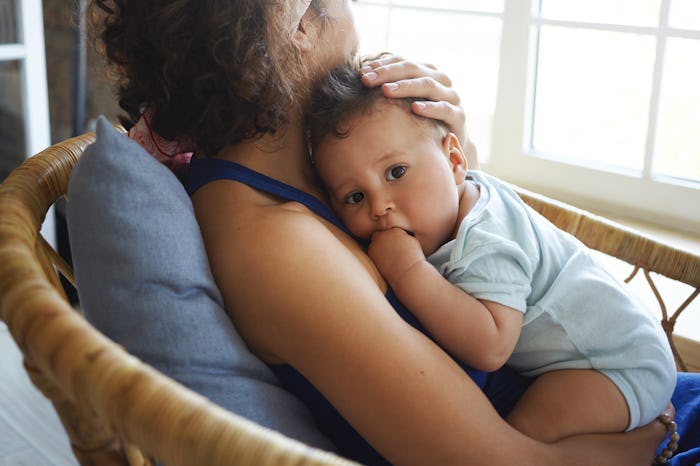Life

How Cuddling Can Help Sensitive Kids, According To An Expert
My son has big feelings. Big, big feelings. His heart is firmly secured on his sleeve (like his mom's) so it's not uncommon for my son to cry when Bing Bong disappears in Inside Out, when his 8-month-old baby brother cries because he thinks the baby is hurt, or because a friend at school is sad. I love my sensitive boy, and I love how cuddling can help sensitive kids like him. Not only do I get some extra time snuggling with my first baby, but I can let him know, through touch, that he doesn't have to try and navigate his big feelings by himself.
"Children (and adults) who enjoy cuddling or physical touch as a show of unconditional love have the feel-good hormones, such as dopamine and serotonin, increase in their brains and thus improve their mood," Maureen Healy, author of The Emotionally Healthy Child and emotional health expert at Growinghappykids.com, tells Romper. A 2017 study published in Pediatrics found that babies who were cuddled — or received skin-to-skin contact — showed better neurodevelopment, a reduction in hyperactivity, had higher IQs, were less likely to miss school, and even received higher wages as adults than those who didn't receive skin-to-skin contact when they were babies.
Of course, it's important to remember that no two children are the same, so while one sensitive child might love to be cuddled, another may not. "The goal is to help your sensitive child feel unconditionally loved and accepted," Healy says, "which may or may not include lots of hugs and touching." It's important that every child's unique personality and preferences are honored, Healy tells me, so that, as parents, we can better address their needs.
According to Healy, there are a number of things parents can do to help their sensitive children that don't necessarily include cuddling, including but not limited to: seeing their sensitivity as a gift, creating areas of calmness, applying gentle discipline, and partnering with your child to complete a task so they do not feel alone.
"We need to respect a child's personal preferences to cuddle or not cuddle," Healy tells me. "If a child says, 'I don't want to be hugged or touched,' we need to respect that. Think of ways you can help your child express his or her feelings constructively. I recommend saying, 'I'm here for you,' so they know you love them and if you need anything you are there."
But if your child does love cuddling, science has shown that positive and friendly touch will help them in the short- and long-term. A 2015 study published in Applied Developmental Science found that children who receive "affectionate touch" are less likely to be anxious when they're adults. And a cuddle as short as a hug, according to one 2012 study published in Psychosomatic Medicine, found that when loved ones offer physical support to someone in distress, the person in distress and the loved one supporting them both experience a decrease in stress.
"Every parent is different, but some moms and dads enjoy the touch of their children," Healy says. "It makes them feel loved and connected. It's important to establish a honest and healthy connection with your child, and that may be facilitated by cuddling." Cuddling might also protect your sensitive child from illness, according to a 2014 study published in Psychological Science, which studied 400 participants and found that those who had a greater support system were less likely to suffer from upper respiratory infection or illness.
Of course, a child doesn't have to be sensitive to benefit from a few consensual cuddles, but it's clear that if your sensitive child does love to snuggle, they can experience short- and long-term benefits that are likely to pay dividends in a number of areas in their life. And hey, you get the chance to snuggle your little one, too!
This article was originally published on